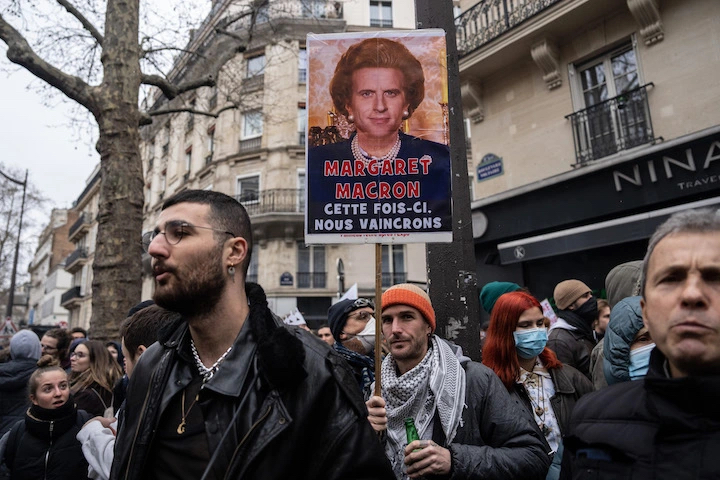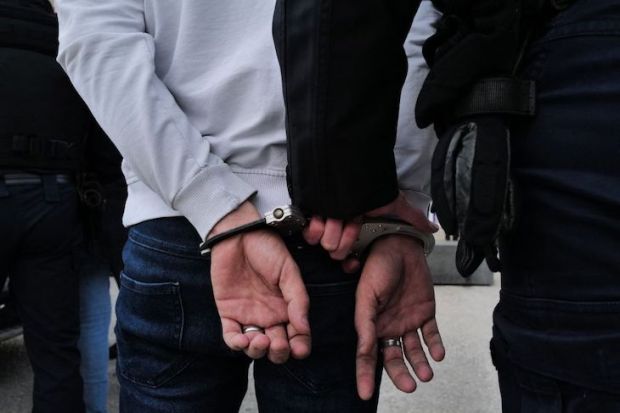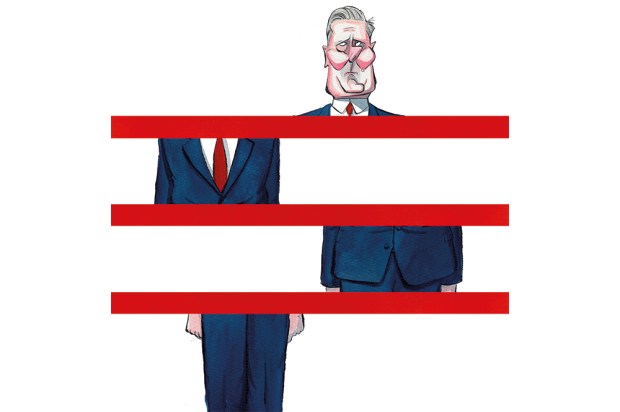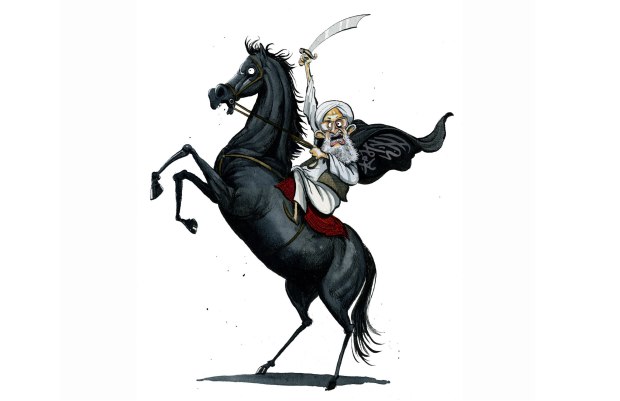There was a sense of foreboding in France at the start of this week. After the anarchy of last Thursday and the extraordinary violence in western France on Saturday, where radical environmentalists fought a pitched battle with police, what would the next seven days bring?
Much of the media speculated that the 10th day of action organised by unions in protest at the government’s pension reform bill would result in the sort of scenes witnessed across France five days earlier, with city halls torched, shops sacked and police stations attacked. Jean-Luc Mélenchon, the leader of the left-wing La France Insoumise, was accused by the government on Monday of tacitly encouraging the disorder. Yesterday, he called for protestors to make their point peacefully.
Along with tens of thousands of others, I assembled in the Place de la République at lunchtime on a raw March day. Crowds of people were standing around talking, browsing the stands selling left-wing tracts or eating hot dogs from one of the many vendors. The unions brought colour and music to the occasion, their floats blasting out a range of tunes from 1980s disco classics to The Internationale. A few protestors wore fancy dress, including a woman in convict’s garb with a sign around her neck declaring ‘two years’ hard labour’, a reference to the raising of the retirement age from 62 to 64 under the pension reform bill.
Two pipers, one in a kilt, stood before a cordon of police in body armour playing songs including Flower of Scotland and The Skye Boat Song. I had a chat with the kilted piper; he was a Frenchman with, he told me in a whisper, some English blood.
At around 2 p.m. the procession began its slow march east from the Place de la République to the Place de la Nation. The pace of the protestors was controlled by the police, who led the procession along the two miles of the Boulevard Voltaire. They were disciplined and well drilled, one line walking in the same direction as the procession, a second line facing the crowd. Ten metres back was a reserve line.
The atmosphere among the protestors was jolly, like a crowd leaving a sporting event, and just as diverse: young and old, men and women, all classes – although the majority were white. What was different to the other marches I’ve attended over the years, such as the Yellow Vest demos of 2018 and the anti-Covid passport protests of 2021, was the lack of singing and the absence of the French flag. I counted half a dozen tricolores yesterday, though I did spot a Cuban and a Palestinian flag.
There was the odd chant, one about the street belonging to ‘the people’ and that old favourite ‘Macron, Démission’ [Macron, resign]. Of the many placards brandished, the one that caught my eye was titled ‘Margaret Macron’ over an image of the president’s face and Thatcher’s hair. Underneath was written: ‘This time we’ll win.’ I asked the man holding it if he was British. He wasn’t, but he had some pithy observations about the Iron Lady and the unions. ‘It’s the same struggle,’ he told me.
Halfway along the Boulevard Voltaire, the atmosphere began slowly to change. Young men dressed in black and wearing masks or hoods began appearing – not in large gangs, just ones and twos – slipping in among the main procession. A couple of hotheads pushed their way to the front of the procession and began taunting the police. A few firecrackers were thrown and someone began a chant, ‘we hate the police’. It wasn’t taken up.
It took about an hour and a half to reach the Place de la Nation. On arrival, protestors sat on the grass and tucked into picnics they’d been carrying. Press photographers milled around looking slightly disappointed; a snap of someone eating a baguette was not going to make the front page. Suddenly a couple of youths set fire to a green wheelie bin. The photographers raced into action. Within five minutes the flames had been doused by a fire crew.
As more people streamed into the Place de la Nation, those who had arrived at the head of the procession began to disperse. I gave it an hour, then headed home. Walking down the Rue du Faubourg Saint-Antoine to the metro I passed a parked convoy of CRS vehicles. Policemen in riot gear lounged inside or stood on the pavement, talking into mobile phones.
The CRS were in action by the time I was home. The television news showed skirmishes in the Place de la Nation but they were minor compared to the previous week. There were 27 arrests from a crowd of 93,000 in Paris.
The numbers will have delighted the government. There was no repetition of last week’s anarchy and, more significantly, the huge crowds forecast by some in the media failed to materialise. In total, there were 740,000 demonstrators on the streets of France yesterday – 360,000 fewer than Thursday. There was also a drop in the number of teachers and railway workers who spent yesterday on strike, and the announcement that the Parisian binmen are going back to work today after three weeks of industrial action was more good news for Macron.
It would be premature to declare Macron the victor in his battle with the unions. They are not ready to admit defeat, and the next round of organised protest will take place next Thursday. But it would appear they are losing the street. There wasn’t much anger on it yesterday; there was camaraderie and conviviality, but not a sense that this is a fight that can be won.
Got something to add? Join the discussion and comment below.
Get 10 issues for just $10
Subscribe to The Spectator Australia today for the next 10 magazine issues, plus full online access, for just $10.





















Comments
Don't miss out
Join the conversation with other Spectator Australia readers. Subscribe to leave a comment.
SUBSCRIBEAlready a subscriber? Log in